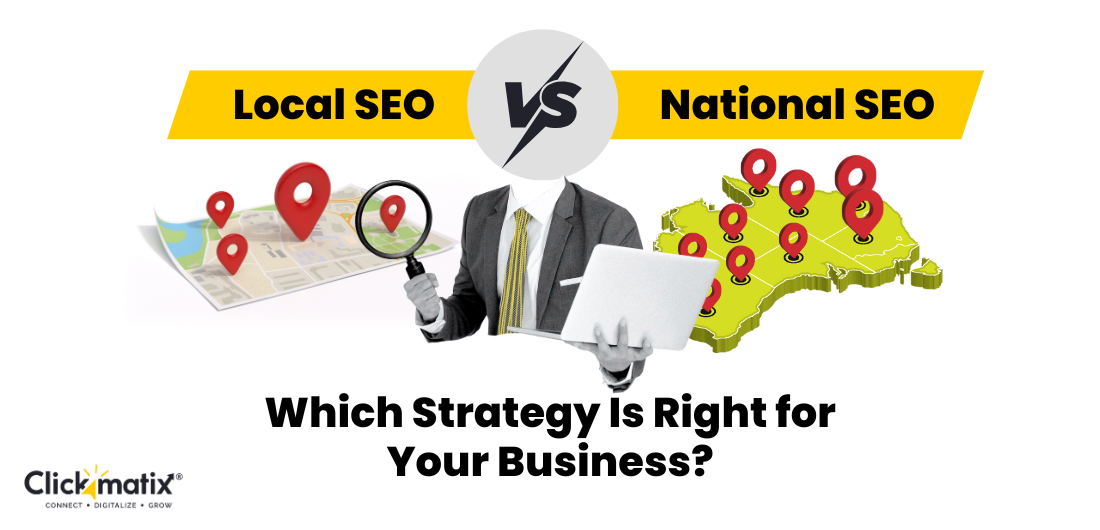
For businesses of all sizes, being visible on search engines has become essential. But the question many businesses face is not whether to invest in SEO, but what type of SEO to pursue. Should you focus on Local SEO vs National SEO to capture your nearby customers or aim to build a wider audience? The answer depends on your goals, location, and long-term growth strategy.
Choosing the right SEO strategy can significantly influence your online reach, traffic quality, and ultimately your conversions. So, how do you determine which one is right for your business?
This blog breaks down the differences between local vs national SEO, compares key components of both, and helps you decide which approach (or combination) best fits your objectives.
Why SEO Strategy Matters Today?
With over 8.5 billion Google searches conducted daily, search engines are the go-to source for consumers seeking products, services, and information. Whether someone is trying to find a local plumber or researching the best fitness apps nationwide, businesses that appear on the first page of search results enjoy the majority of traffic and trust.
But getting there requires more than just good content. It takes a solid SEO strategy that aligns with your business model and audience.
Whether you’re aiming for local search results to attract nearby customers or broader visibility across Australia, your SEO approach needs to be intentional. It’s not just about being seen, it’s about being seen by the right people, at the right time, for the right reasons.
Understanding the Basics
To fully appreciate the power of search engine optimisation (SEO), it’s crucial to distinguish between the two primary approaches: Local SEO vs National SEO. While both aim to improve visibility in search results, they cater to different business objectives and target audiences.
-
What Is Local SEO?
Local SEO focuses on improving your visibility in search results for a specific geographic location. It targets people who are looking for services or products “near me” or in a specific suburb, city, or region.
A successful Local SEO strategy often involves:
- Optimising your Google Business Profile.
- Listing your business in online directories.
- Using local keywords (e.g., “SEO service Melbourne”).
- Getting local backlinks.
- Managing reviews and ratings.
This is particularly effective for physical stores, trades, restaurants, and service areas with a local presence.
-
What Is National SEO?
National SEO, on the other hand, aims to rank your website across an entire country rather than just a specific city or region. It’s ideal for businesses with a broader reach, such as e-commerce brands, online service providers, or national franchises.
A National SEO strategy focuses on:
- Broader, non-location-specific keywords.
- High-quality content for wide-reaching topics.
- Strong link building from reputable national websites.
- Advanced technical optimisation for scalability.
- Building strong domain authority over time.
Key Differences Between Local SEO Vs National SEO
While both Local and National SEO aim to secure higher search engine rankings, their methodologies diverge significantly due to their distinct geographical objectives.
1. Geographical Targeting
- Local SEO targets specific suburbs, cities, or regions.
- National SEO targets users across the entire country (e.g., Australia).
If you’re an SEO company in Melbourne, your Local SEO would focus on “Melbourne SEO services.” For National SEO, you may aim for broader terms like “SEO agency Australia.”
2. Keyword Strategy and Intent
- Local SEO focuses on geo-specific keywords like “plumber in Carlton” or “SEO agency in Melbourne.”
- National SEO focuses on competitive, broad terms like “best SEO strategies” or “digital marketing professionals.”
User intent also differs; local searches often aim to contact or visit a business, while national and international SEO queries may focus on comparison or information gathering.
3. Content Focus and Structure
- Local SEO content often includes location-specific landing pages, blogs about local events or customer success stories, and FAQs relevant to the local area.
- National SEO requires long-form, evergreen content targeting a broader audience, such as detailed guides, industry insights, or national trend analysis.
Both types benefit from regular updates, but the tone, depth, and scope of the content vary greatly.
4. Competition Level and Domain Authority Needs
- Local SEO tends to be less competitive, especially in niche or suburban markets.
- National SEO typically involves high competition and requires a robust domain authority to compete with established brands.
If you’re just starting, it’s easier to rank for local terms and build your presence from there.
5. Backlink Profile Requirements
- Local SEO relies on backlinks from regional directories, local news outlets, and community organisations.
- National SEO requires a broader approach, including guest posts, industry publications, and mentions on authoritative national websites. Partnering with a link-building agency is often a valuable investment.
6. Technical SEO Considerations
Both strategies require:
- Mobile-friendly design.
- Fast page loading times.
- Clean URL structures.
- Secure (HTTPS) connections.
However, National SEO requires more scalability in site architecture, particularly when managing hundreds of pages or product listings.
How to Decide Which SEO Strategy is Right for You?
Choosing between Local vs National SEO, or a combination of both, is a critical decision that directly impacts your digital marketing success. This choice should align deeply with your overall business objectives and the specific nature of your operations. Here’s a breakdown of factors to consider when making this determination:
Evaluating Your Business Goals and Target Audience
Start by asking:
- Do I want to attract nearby customers or a broader audience?
- Is my service area fixed or flexible?
- What does my ideal customer search for?
If your business is location-dependent, Local SEO will likely deliver quicker, more targeted results. If you’re aiming for widespread recognition or selling Australia-wide, National SEO is a better fit.
Considering Your Location and Service Area
If your customer base is within a few postcodes, local optimisation is essential. This includes setting up your Google Business Profile, acquiring local citations, and engaging with nearby customers.
If you’re targeting multiple cities or states, consider developing a National SEO strategy that supports geographic scalability.

Get weekly insights for revenue-shifting results
Sign up for our newsletter and be the first one to know about our exclusive offers, digital marketing news and updates.
|
|
Thank you for Signing Up |


Assessing Budget and Resources
Local SEO is generally more affordable and manageable for small businesses. National SEO often requires a bigger budget for content production, link building, and technical improvements.
If you’re looking for professional support, working with an experienced SEO agency in Melbourne, like Clickmatix, can provide tailored strategies to suit both local and national campaigns.
Analysing Your Competition
Use tools like SEMrush or Ahrefs to see who’s ranking for your target keywords. If local competitors dominate your area, Local SEO gives you the chance to rise quickly. For national competition, you’ll need a long-term, high-value strategy.
Where You Are in the Business Lifecycle
Startups and small businesses typically benefit from starting local. Once you’ve gained trust and traffic, expanding into National SEO and eventually Global SEO becomes easier.
Hybrid SEO Strategy: Can You Combine Both?
The good news is that for many businesses, the answer isn’t an either/or choice between local and national SEO. A hybrid SEO strategy, which intelligently combines elements of both, can often yield the most comprehensive and effective results. This approach allows businesses to capture both nearby customers and a broader national audience simultaneously.
When a Dual Approach Makes Sense?
If you’re servicing a local base while planning to expand, or have multiple branches across Australia, a hybrid strategy ensures you’re not missing opportunities.
Example: An Enterprise SEO strategy for a multi-city brand might involve creating local landing pages, supported by broader national blog content and targeted outreach.
Structuring Your Website for Both Local and National Reach
Tips include:
- Use subfolders or subdomains for different cities.
- Create unique pages for each service area.
- Maintain a clean, intuitive site structure.
- Include internal links between local and national content.
This structure supports better crawling and indexing, improving your search engine visibility.
Measuring Success: KPIs for Local vs National SEO
To effectively gauge the performance of your SEO efforts and ensure you’re achieving your business objectives, it’s essential to track the right Key Performance Indicators (KPIs). The metrics you prioritise will differ significantly depending on whether your primary focus is Local SEO, National SEO.
Local SEO Metrics to Track
- Google Business Profile views and actions.
- Local keyword rankings.
- Map pack appearances.
- Local organic traffic.
- Click-to-call rates.
- Customer reviews and engagement.
National SEO Performance Indicators
- National keyword rankings.
- Organic sessions from across the country.
- Conversion rates from blog or landing pages.
- Backlink growth and domain authority.
- Featured snippet appearances.
Tools for Tracking and Reporting SEO Performance
Use tools like:
- Google Search Console
- Google Analytics 4
- SEMrush
- BrightLocal (for local rankings)
- Ahrefs (for backlink tracking)
If you’re managing both local and national campaigns, working with a professional SEO service in Melbourne ensures consistency and performance tracking across all levels.
Common Mistakes to Avoid
Even with a clear strategy, certain pitfalls can derail your SEO efforts. Being aware of these common mistakes, whether you’re focusing on local, national, or a hybrid approach, can save you time, resources, and missed opportunities.
Targeting the Wrong Audience or Keywords
One of the most frequent missteps is failing to align your keyword strategy with your actual target audience and business scope. For instance, if you operate a specific service in a particular area, targeting generic terms such as “plumbing services” nationwide without any local context won’t attract relevant traffic. Your efforts will be diluted, and you’ll struggle to compete with national players.
Conversely, a nationwide e-commerce store selling artisan crafts would severely limit its potential by targeting only local “craft stores near me” keywords, thereby ignoring the vast online market across the country. Specificity is key. Know your geographical reach and the precise intent of your potential customers.
Neglecting Local Listings or National Backlinks
SEO success relies heavily on both on-site and off-site optimisation. A critical mistake is to prioritise one while neglecting the other. For local SEO, a lack of consistent and optimised local citations (your business’s Name, Address, Phone number across online directories) or an unmanaged Google Business Profile will severely limit your visibility in local search results and maps. Search engines rely on these signals to verify your local presence and trustworthiness.
For National SEO, ignoring the development of a strong backlink profile (links from other reputable websites to yours) will prevent your site from building the authority needed to rank for competitive national keywords. Failing to prioritise either of these crucial off-site elements, alongside your on-site content optimisation, will inevitably limit your search visibility.
Ignoring Mobile Optimisation
Mobile-first indexing is not merely a suggestion; it’s a standard for Google. This means Google primarily uses the mobile version of your website for indexing and ranking. If your site isn’t fully responsive and optimised for mobile devices, you’re at a significant disadvantage. Common issues include slow load times on mobile devices, unclickable elements due to small screen sizes, difficult navigation on smaller screens, and content that fails to display correctly.
Neglecting mobile optimisation can lead to higher bounce rates, lower rankings, and ultimately, a loss of both local customers searching on their phones and national visitors who abandon your site due to a poor mobile experience.
Overlooking Analytics and Adjustments
SEO is an ongoing process that requires continuous monitoring, analysis, and refinement. Neglecting to regularly review your analytics data (from tools like Google Analytics and Google Search Console) means you’re missing vital insights into what works and what doesn’t. You won’t identify underperforming keywords, discover new content opportunities, or spot technical issues impacting your rankings.
Effective SEO involves continually tweaking your content, updating your Google Business Profile with fresh information and posts, refining your keyword targeting based on new trends or competitor moves, and adjusting your strategies in response to performance metrics and algorithm updates. Without this iterative approach, your initial SEO gains will likely stagnate or decline.
Conclusion:
Choosing between Local SEO vs National SEO comes down to understanding your business model, audience, budget, and long-term goals. Local SEO is perfect for targeting nearby customers and generating quicker leads, while National SEO is ideal for reaching broader markets and building long-term authority.
For many businesses, a hybrid approach that combines both strategies offers the best path forward, especially when managed strategically by an experienced SEO agency in Melbourne, like Clickmatix.
Need help tailoring your SEO strategy? Call 1300 159 314 today to get started.
In search for strategic sessions?
Let us understand your business thoroughly and help you
strategies your digital product.
It's time to call your business-
a brand!
Australian Owned Agency
Save Time and Money
Unbeatable Value
Where Work Gets Done
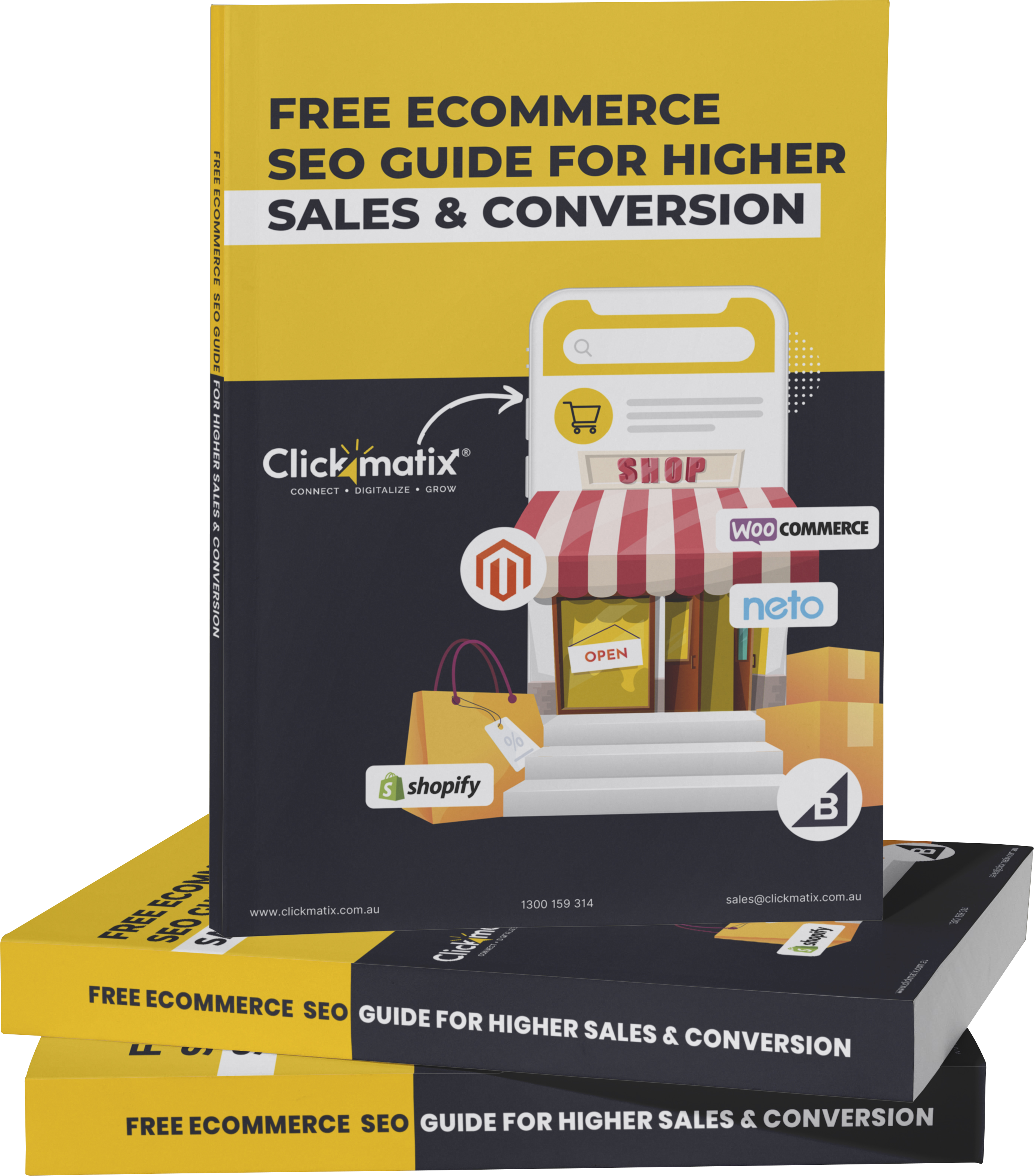
free Ecommerce SEO guide for Higher Sales & Conversion



THE ULTIMATE MARKETING GUIDE FOR LAWYERS



Youtube Ads Guide How to Advertise on Youtube



free Ecommerce SEO guide for Higher Sales & Conversion


It's time to call your business-
a brand!
Australian Owned Agency
Save Time and Money
Unbeatable Value
Where Work Gets Done


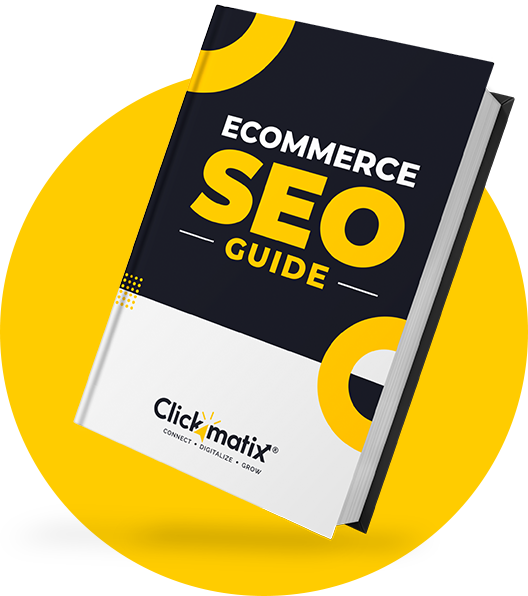
The Game-Changing Ecommerce SEO Guide That Will Blow Your Mind & Sales
With this Ecommerce SEO Guide, you'll be able to:
- Develop a Ecommerce SEO strategy.
- Build a content marketing strategy that aligns with your business goals.
- Convert your website visitors into paying customers.



Youtube ads guide how to advertise on youtube
With this Youtube ads Guide, you'll be able to:
- Develop a Youtube ads strategy.
- Build a type of ads of your own that aligns with your business goals.
- Generate revenue from youtube ads.
It's time to call your business-
a brand!
Australian Owned Agency
Save Time and Money
Unbeatable Value
Where Work Gets Done








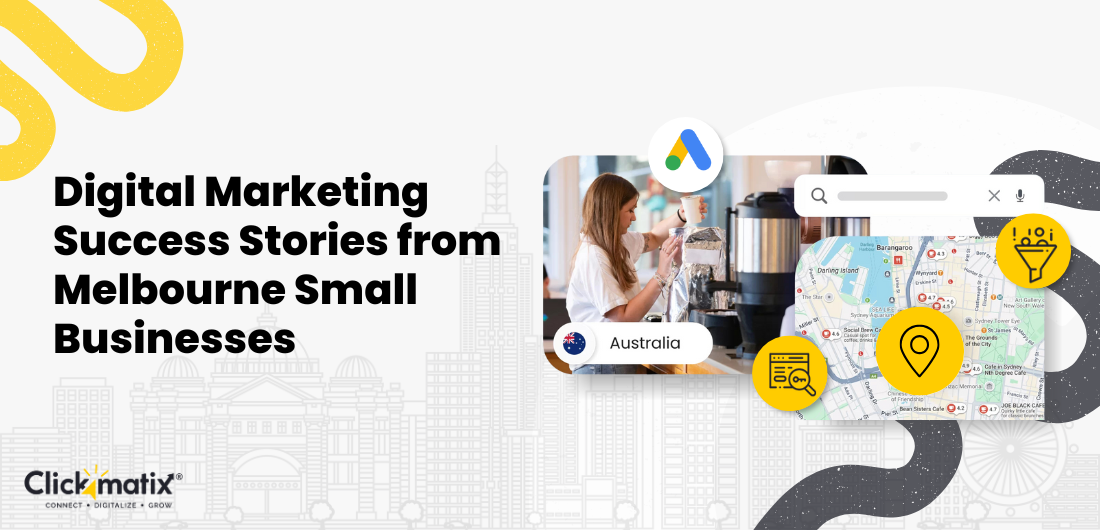


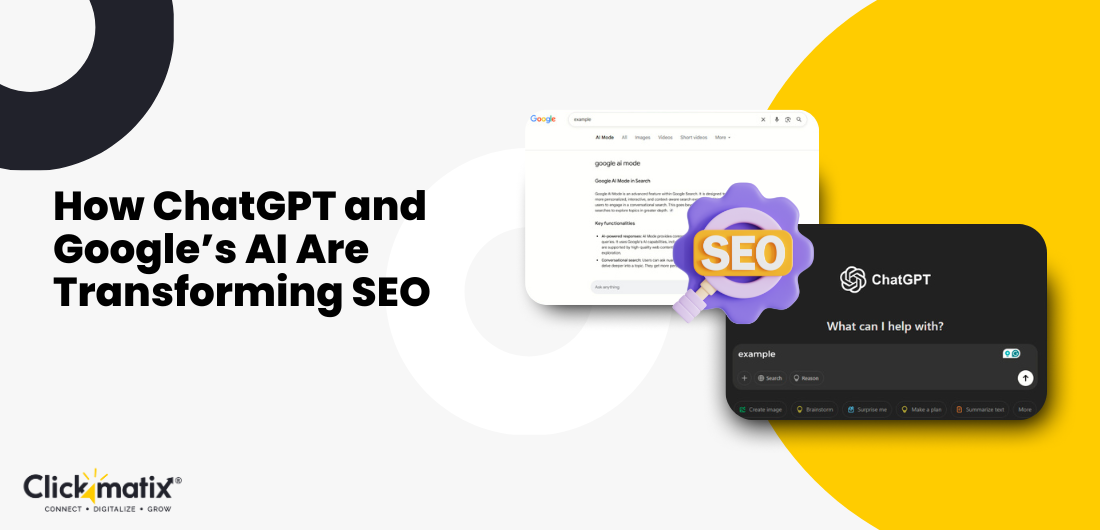
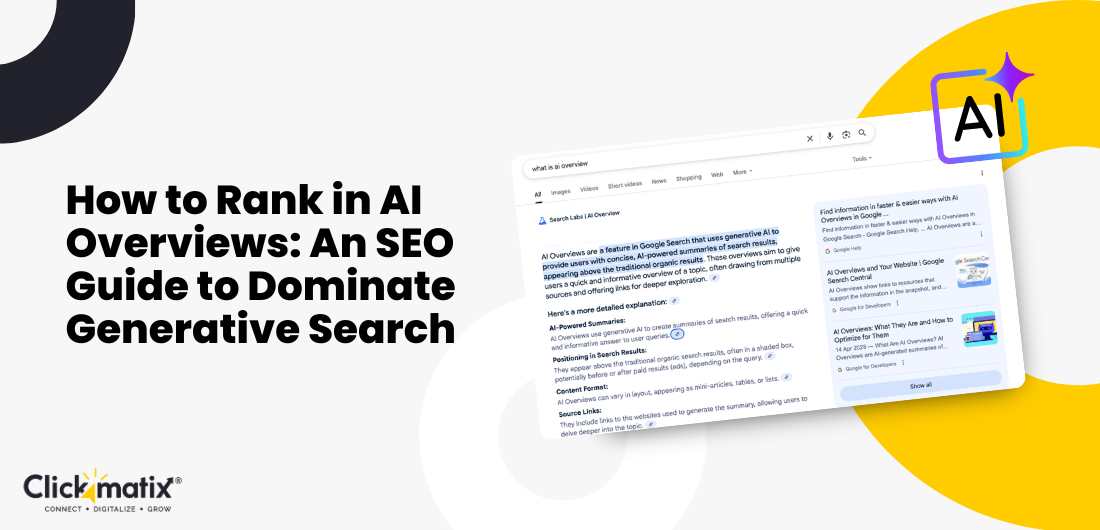
 Australian Owned Agency
Australian Owned Agency Save Time and Money
Save Time and Money Unbeatable Value
Unbeatable Value Where Work Gets Done
Where Work Gets Done